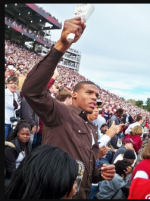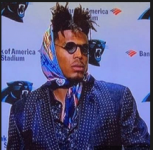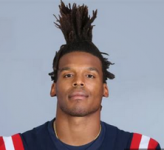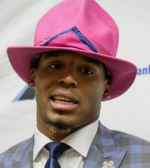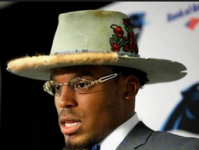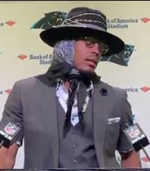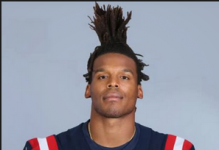I'm sure this will go over well.

 oanow.com
oanow.com
Cam Newton doesn’t go back to the Heisman Trophy ceremony each year because he was told in 2010 that his father shouldn’t be present at the ceremony when he won it, Newton revealed in a podcast visit with Shannon Sharpe published Thursday.
Newton also surmised that Dan Mullen and his wife Megan Mullen fueled media reports during the 2010 season as anonymous sources, bitter that he didn’t go to Mississippi State to join a coach that had previously coached him at Florida.
Newton, speaking on Sharpe’s Club Shay Shay podcast, said that, rather, he simply was never that close to the Mullens to begin with. He said that while many assumed he had to have taken money to spurn Mullen, it was never far-fetched for him to pick another coach besides the one that didn’t give him playing time at Florida anyway
Newton maintained that he and his family got no money for his going to Auburn — in a discussion in which he opened up vulnerably about trauma he experienced during the 2010 season playing through one of the most talked about NCAA investigations ever.
“I remember winning the Heisman, the ceremony, stuttering, I was nervous — but I didn’t want to be there,” Newton said. “I wanted to be with my dad. I wanted to be with my family.”
Now as a 34-year-old man, Newton said he looks back and is surprised at how he at 21 years old managed to go through that season with the focus he had, pointing to media members staking out his house, being chided and called “Scam Newton,” all the way up to stadium workers at Bryant-Denny Stadium playing ‘Son of a Preacher Man’ during warmups before the Iron Bowl.
“I was fighting so much more off the field, that, on the field was just a playground,” Newton said. “That was my place of refuge. ‘You can’t talk to me, reporter, while I’m playing. I’m at peace. La la la la la la.’ And every time I ran, I ran with a vengeance. I wanted to hurt somebody, because I was hurt. And I used it as a way to give me my edge.”
He said his recruitment coming out of junior college was entirely different from his recruitment coming out of high school, saying it was more business-like — but not business-like in that money was involved, but more business-like in that he wanted to make an educated decision on what offense he best fit in and what team was in the best position to get him to a BCS game, saying he was confident that if he had that kind of season and played on that platform that he’d be a top-10 pick in the NFL Draft.
Newton was at Florida for the 2007 and 2008 seasons before transferring to Blinn for the 2009 season. He said enough of his former teammates on those stacked Florida rosters were already in the NFL such that his goal was to get to the NFL as quickly as possible.
“When I went to Auburn, my mental was solely focused on success,” he said. “When I went to Auburn, they mentioned that they had 22 seniors coming back. Mississippi State probably only had three to four.”
Auburn at the time was also returning four starters along the offensive line from the 2009 season.
He said he got “iffy” vibes from the Mullens after he went to shake Dan’s hand after Auburn’s win over Mississippi State in the second game of the 2010 season. Later that fall, ESPN’s Joe Schad reported that sources said that Newton had called two unnamed Mississippi State recruiters sorrowful that he couldn’t go to Mississippi State, saying he wanted to go to Mississippi State but that his father was forcing him go to Auburn because there was too much money to be made.
Newton’s side of the story is completely different — with him saying it’s not that unreasonable for any recruit to pick another school besides Mississippi State — and saying those sources were Dan and Megan Mullen.
“I gave him this quote: ‘It was just too good to be true.’ Now, ‘too good to be true’ for me was you’ve got 22 seniors. They’re battle-tested. I ain’t going into a locker room with freshmen. They’re ready to win right now. They just need me to propel them to elite status,” Newton said. “Mississippi State needed me and some and I don’t think Mississippi State garners the measure of recruits — I mean, come on man, it’s Mississippi State here.”
He said the only reason he called Dan Mullen prior to his commitment to Auburn going public was because his father insisted he do so. He said the conversation was “extremely awkward” and that Dan Mullen was indignent and demanded answers of him after he said he was going to Auburn instead.
He said he heard Megan Mullen in the background asking if he committed, and that’s when he talked to her: “I was like, ‘Man, I just apologize, but this is a business decision. I’m sad that it didn’t work out.’ I had that conversation when I was 20. And I thought I was doing the right thing.”
Ultimately, Newton suspects he was done wrong as a youngster by bitter older adults.
“That was just a grenade thrown into the crowd, to just have a bitter person — ‘He didn’t come to my school, so he had to have took some money to go to that school, because we already had a relationship.’ But I was thinking to myself, ‘You didn’t play me while you were at Florida.’ ... I’ve seen your true self. I didn’t want to get burnt twice,” Newton said.
At the time, former Mississippi State player Kenny Rogers, who said he played a part in connecting Oregon transfer Jeremiah Masoli to Ole Miss, said in a radio interview that Cecil Newton told him it would take money to get Cam to go to Mississippi State. Former Mississippi State players and boosters John Bond and Bill Bell said Rogers approached them saying as much, though they stopped short of saying they heard Cecil say that. An ESPN report by Chris Low and Mark Schlabach that fall quoted Rogers’ lawyer Douglas Zeit as saying Rogers had no discussions with anyone at Auburn regarding Newton, and that he didn’t know whether anyone at Auburn had done anything.
In March 2011, an ESPN article by Kelly Naqi reported that Willie Lyles had told Texas A&M it would have to “beat” $80,000 if Texas A&M were to sign Patrick Peterson. Peterson’s father was quoted in the article saying Lyles acted as a would-be agent and a go-between trying to make a profit — saying the same thing happened to the Newtons, ostensibly with Rogers playing that part.
“It’s like Cam Newton, same thing,” he said in that story. “These guys — they are trying to get paid. You have to be careful who you talk to, who you deal with it. I just know him [Lyles] from the camps.
“It could have come out of [Lyles’] mouth, that’s what happens. These guys try to make money on their own, they are kind of like escort services. That’s what I call them, escort services.”
Back at Auburn, Newton said ultimately that Cecil “jumped on the grenade.” The NCAA in October 2011 eventually said it found that Cecil sought payment for Cam’s signing unknowingly to Cam and unknowingly to Auburn officials — also determining after going through bank records, IRS statements and phone and email records that there was no proof the Newtons were paid for Cam’s signing.
“He said, ‘Look, how can we allow my son to play?’ ‘Well, we’re going to need somebody to take this rap.’ My father, without blinking, said, ‘Well, I’ll take it. Paint me however you want to paint me. I’ll do it for my son. He’s going to be eligible to play? Cool. I’ll take it,’” Newton said.
“My father has done nothing wrong and was painted as a villain, still to this day,” he added.
He said he felt he had to put on a stoic face, but that no one around him could relate to what he was going through — including his teammates, his coaches and even his own family.
“When someone would ask, ‘Cam, you alright?’ ‘Yeah, yeah, I’m good’ — knowing good and well I was suffering in silence. ... Not only am I being investigated throughout the day, I’m trying to play the best form of football that I possibly can during gametime — and I can’t speak to them. I’m talking to my dad, I’m talking to my brothers, I’m talking to my family, but they don’t get it,” Newton said. “They’re there for support, but it’s not like, ‘We understand what you’re saying.’”
Lonely in that plight, he drove Auburn to a national championship and said he took out his emotions on the field.
“It’s hard,” he said. “We’re playing, after that, you’ve got LSU, you’ve got Arkansas, you’ve got Georgia, you’ve got all these games and I’m like, ‘Yo.’ On top of that, this is the greatest season that Auburn University has ever had. You’ve got Alabama! How are you doing this? I was having an out of body experience. I’m surprised at myself, with the measure of focus that I had to go through.”
He counts himself lucky as being able to use trauma to push forward in a physical way on the field, empathizing with Black men and families quietly shouldering their own plights and working jobs with no such avenue. He also opined with Sharpe about his observation that a LaVar Ball or Earl Woods or Richard Williams receives scrutiny quicker than an Archie Manning does, and he considers his own father part of the former category.
As for his Auburn career, the Tigers finished 14-0 as national champions, and neither his Heisman Trophy nor Auburn’s crystal ball have been rescinded. Newton pointed to Nick Fairley, Terrell Zachery, Darvin Adams, Michael Dyer and Lee Ziemba by name among others who played a major role in the championship season.
“I got a lot of the credit, but these are the unsung heroes too,” Newton said.

‘I was suffering in silence’: Cam Newton opens up on Dan Mullen, Heisman trust, and his trauma during NCAA investigation at Auburn
Cam Newton in a new interview says Dan Mullen acted bitter and stoked the flames of controversy during the 2010 season.
Cam Newton doesn’t go back to the Heisman Trophy ceremony each year because he was told in 2010 that his father shouldn’t be present at the ceremony when he won it, Newton revealed in a podcast visit with Shannon Sharpe published Thursday.
Newton also surmised that Dan Mullen and his wife Megan Mullen fueled media reports during the 2010 season as anonymous sources, bitter that he didn’t go to Mississippi State to join a coach that had previously coached him at Florida.
Newton, speaking on Sharpe’s Club Shay Shay podcast, said that, rather, he simply was never that close to the Mullens to begin with. He said that while many assumed he had to have taken money to spurn Mullen, it was never far-fetched for him to pick another coach besides the one that didn’t give him playing time at Florida anyway
Newton maintained that he and his family got no money for his going to Auburn — in a discussion in which he opened up vulnerably about trauma he experienced during the 2010 season playing through one of the most talked about NCAA investigations ever.
“I remember winning the Heisman, the ceremony, stuttering, I was nervous — but I didn’t want to be there,” Newton said. “I wanted to be with my dad. I wanted to be with my family.”
Now as a 34-year-old man, Newton said he looks back and is surprised at how he at 21 years old managed to go through that season with the focus he had, pointing to media members staking out his house, being chided and called “Scam Newton,” all the way up to stadium workers at Bryant-Denny Stadium playing ‘Son of a Preacher Man’ during warmups before the Iron Bowl.
“I was fighting so much more off the field, that, on the field was just a playground,” Newton said. “That was my place of refuge. ‘You can’t talk to me, reporter, while I’m playing. I’m at peace. La la la la la la.’ And every time I ran, I ran with a vengeance. I wanted to hurt somebody, because I was hurt. And I used it as a way to give me my edge.”
Newton’s recruitment to Auburn
Newton recapped to Sharpe his recruitment coming out of Blinn College as a JUCO transfer, reaffirming that his finalists were Oklahoma, Kansas State, Mississippi State and Auburn.He said his recruitment coming out of junior college was entirely different from his recruitment coming out of high school, saying it was more business-like — but not business-like in that money was involved, but more business-like in that he wanted to make an educated decision on what offense he best fit in and what team was in the best position to get him to a BCS game, saying he was confident that if he had that kind of season and played on that platform that he’d be a top-10 pick in the NFL Draft.
Newton was at Florida for the 2007 and 2008 seasons before transferring to Blinn for the 2009 season. He said enough of his former teammates on those stacked Florida rosters were already in the NFL such that his goal was to get to the NFL as quickly as possible.
“When I went to Auburn, my mental was solely focused on success,” he said. “When I went to Auburn, they mentioned that they had 22 seniors coming back. Mississippi State probably only had three to four.”
Auburn at the time was also returning four starters along the offensive line from the 2009 season.
Newton and the Mullens
Newton said Mullen talked to him about transferring to join him at a new school even when the both of them were at Florida — but he said his relationships with the Mullens was not all it was cracked up to be by those suspicious of why he’d spurn them to go to Auburn in 2010.He said he got “iffy” vibes from the Mullens after he went to shake Dan’s hand after Auburn’s win over Mississippi State in the second game of the 2010 season. Later that fall, ESPN’s Joe Schad reported that sources said that Newton had called two unnamed Mississippi State recruiters sorrowful that he couldn’t go to Mississippi State, saying he wanted to go to Mississippi State but that his father was forcing him go to Auburn because there was too much money to be made.
Newton’s side of the story is completely different — with him saying it’s not that unreasonable for any recruit to pick another school besides Mississippi State — and saying those sources were Dan and Megan Mullen.
“I gave him this quote: ‘It was just too good to be true.’ Now, ‘too good to be true’ for me was you’ve got 22 seniors. They’re battle-tested. I ain’t going into a locker room with freshmen. They’re ready to win right now. They just need me to propel them to elite status,” Newton said. “Mississippi State needed me and some and I don’t think Mississippi State garners the measure of recruits — I mean, come on man, it’s Mississippi State here.”
He said the only reason he called Dan Mullen prior to his commitment to Auburn going public was because his father insisted he do so. He said the conversation was “extremely awkward” and that Dan Mullen was indignent and demanded answers of him after he said he was going to Auburn instead.
He said he heard Megan Mullen in the background asking if he committed, and that’s when he talked to her: “I was like, ‘Man, I just apologize, but this is a business decision. I’m sad that it didn’t work out.’ I had that conversation when I was 20. And I thought I was doing the right thing.”
Ultimately, Newton suspects he was done wrong as a youngster by bitter older adults.
“That was just a grenade thrown into the crowd, to just have a bitter person — ‘He didn’t come to my school, so he had to have took some money to go to that school, because we already had a relationship.’ But I was thinking to myself, ‘You didn’t play me while you were at Florida.’ ... I’ve seen your true self. I didn’t want to get burnt twice,” Newton said.
Cam says Cecil took the rap
Newton said his father took a fall that season to expedite Newton’s return to the playing field when presented the opportunity to do so.At the time, former Mississippi State player Kenny Rogers, who said he played a part in connecting Oregon transfer Jeremiah Masoli to Ole Miss, said in a radio interview that Cecil Newton told him it would take money to get Cam to go to Mississippi State. Former Mississippi State players and boosters John Bond and Bill Bell said Rogers approached them saying as much, though they stopped short of saying they heard Cecil say that. An ESPN report by Chris Low and Mark Schlabach that fall quoted Rogers’ lawyer Douglas Zeit as saying Rogers had no discussions with anyone at Auburn regarding Newton, and that he didn’t know whether anyone at Auburn had done anything.
In March 2011, an ESPN article by Kelly Naqi reported that Willie Lyles had told Texas A&M it would have to “beat” $80,000 if Texas A&M were to sign Patrick Peterson. Peterson’s father was quoted in the article saying Lyles acted as a would-be agent and a go-between trying to make a profit — saying the same thing happened to the Newtons, ostensibly with Rogers playing that part.
“It’s like Cam Newton, same thing,” he said in that story. “These guys — they are trying to get paid. You have to be careful who you talk to, who you deal with it. I just know him [Lyles] from the camps.
“It could have come out of [Lyles’] mouth, that’s what happens. These guys try to make money on their own, they are kind of like escort services. That’s what I call them, escort services.”
Back at Auburn, Newton said ultimately that Cecil “jumped on the grenade.” The NCAA in October 2011 eventually said it found that Cecil sought payment for Cam’s signing unknowingly to Cam and unknowingly to Auburn officials — also determining after going through bank records, IRS statements and phone and email records that there was no proof the Newtons were paid for Cam’s signing.
“He said, ‘Look, how can we allow my son to play?’ ‘Well, we’re going to need somebody to take this rap.’ My father, without blinking, said, ‘Well, I’ll take it. Paint me however you want to paint me. I’ll do it for my son. He’s going to be eligible to play? Cool. I’ll take it,’” Newton said.
“My father has done nothing wrong and was painted as a villain, still to this day,” he added.
Newton uses the trauma
Newton now marvels at how his younger self got through the season.He said he felt he had to put on a stoic face, but that no one around him could relate to what he was going through — including his teammates, his coaches and even his own family.
“When someone would ask, ‘Cam, you alright?’ ‘Yeah, yeah, I’m good’ — knowing good and well I was suffering in silence. ... Not only am I being investigated throughout the day, I’m trying to play the best form of football that I possibly can during gametime — and I can’t speak to them. I’m talking to my dad, I’m talking to my brothers, I’m talking to my family, but they don’t get it,” Newton said. “They’re there for support, but it’s not like, ‘We understand what you’re saying.’”
Lonely in that plight, he drove Auburn to a national championship and said he took out his emotions on the field.
“It’s hard,” he said. “We’re playing, after that, you’ve got LSU, you’ve got Arkansas, you’ve got Georgia, you’ve got all these games and I’m like, ‘Yo.’ On top of that, this is the greatest season that Auburn University has ever had. You’ve got Alabama! How are you doing this? I was having an out of body experience. I’m surprised at myself, with the measure of focus that I had to go through.”
He counts himself lucky as being able to use trauma to push forward in a physical way on the field, empathizing with Black men and families quietly shouldering their own plights and working jobs with no such avenue. He also opined with Sharpe about his observation that a LaVar Ball or Earl Woods or Richard Williams receives scrutiny quicker than an Archie Manning does, and he considers his own father part of the former category.
As for his Auburn career, the Tigers finished 14-0 as national champions, and neither his Heisman Trophy nor Auburn’s crystal ball have been rescinded. Newton pointed to Nick Fairley, Terrell Zachery, Darvin Adams, Michael Dyer and Lee Ziemba by name among others who played a major role in the championship season.
“I got a lot of the credit, but these are the unsung heroes too,” Newton said.

